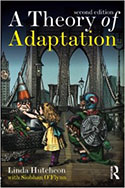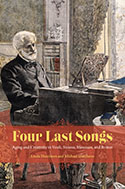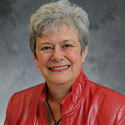

 Linda Hutcheon holds the rank of University Professor Emeritus of English and Comparative Literature at the University of Toronto. A specialist in postmodernist culture and in critical theory, on which she has published 9 books, she has also worked collaboratively in large projects involving hundreds of scholars (the multivolumed Rethinking Literary History, which was awarded a Major Collaborative Research Initiatives grant from the Social Science and Humanities Research Council of Canada in 1996) and smaller ones, most with her spouse, Dr. Michael Hutcheon.
Linda Hutcheon holds the rank of University Professor Emeritus of English and Comparative Literature at the University of Toronto. A specialist in postmodernist culture and in critical theory, on which she has published 9 books, she has also worked collaboratively in large projects involving hundreds of scholars (the multivolumed Rethinking Literary History, which was awarded a Major Collaborative Research Initiatives grant from the Social Science and Humanities Research Council of Canada in 1996) and smaller ones, most with her spouse, Dr. Michael Hutcheon.
It is the complex interrelations of theory with artistic practice that form the common thread in her academic work. As one of a generation formed by the so-called "rise of theory" as an independent area of literary study and influenced by her years of interdisciplinary and comparative training in institutions in the United States, Italy, and Canada, she has nonetheless been as interested in what art teaches us about theory as in the reverse. Her theoretical interests in topics like narrative self-consciousness (in Narcissistic Narrative, 1980, rpt. 1985 and 2013), parody (A Theory of Parody, 1984; rpt. 2003) and irony (Irony's Edge, 1994) made it likely inevitable that she would be attracted to working on "postmodernism" when it hit the scene in the 1980s, first through architecture and then spreading into the study of the other arts and other disciplines. Her three books on this topic- The Poetics of Postmodernism: History, Theory, Fiction (1988); The Politics of Postmodernism (1989; rpt. 2002); The Canadian Postmodern (1989; rpt. 2012)-explore the overlapping of different forms of postmodern discourse: historical, philosophical, psychoanalytic, feminist, Marxist, literary theoretical--in addition to those of the literary, visual, musical, cinematic and architectural art forms themselves. Her newest book, A Theory of Adaptation (2006; rpt. 2012), seeks to challenge both the popular and academic denigration of adaptations-across all media-in order to show how and why adapting is a persistent and ubiquitous mode of storytelling. While teaching at Seneca College and McMaster University in her early years, she began teaching-and then publishing-in the field of Canadian literature. She translated the work of Québec writers Félix Leclerc and Madeleine Gagnon and co-edited a book of interviews and stories on the topic of multiculturalism, a project that grew out of her existence as what she calls a "crypto-ethnic": her marital name hides part of her cultural identity, since her birth surname had been Bortolotti. That said, much of her pedagogical work has been in the area of supervising graduate and postgraduate students (66 completed doctoral dissertations supervised; 72 other dissertation committees; 37 post-doctoral fellowships). Her interdisciplinary collaborative work with Michael Hutcheon on the intersection of medical and cultural history, studied through the vehicle of opera, has yielded articles, book chapters and four completed books thus far: Opera: Desire, Disease, Death/EM> (1996); Bodily Charm: Living Opera (2000); Opera: The Art of Dying (2004); Four Last Songs; Aging and Creativity in Verdi, Strauss, Messiaen, and Britten (2015). In the same spirit of interdisciplinary collaboration, since 2002, she has organized (with 3 colleagues in the Faculty of Music and the English Department) 2 or 3 conferences per year under the auspices of the Munk School of Global Studies Humanities Initiative and the Canadian Opera Company. Each of these "Opera Exchanges", as they are known, offers the broader cultural and historical context for an opera being performed in the city. The recipient of major fellowships and awards (Woodrow Wilson, Killam Research, Guggenheim, Rockefeller, Connaught, Northrop Frye Award) and numerous honorary degrees (in Canada and Europe), in 2000 she was elected the 117th President of the Modern Language Association of America, the third Canadian to hold this position, and the first Canadian woman. She has received both the Killam Award and the Molson Prize for the Humanities, and was made a Fellow of the Royal Society in 1990 and an Officer of the Order of Canada in 2010. |